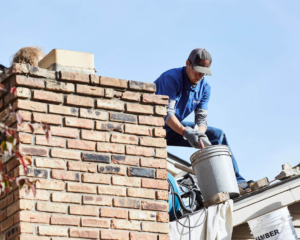Masonry Contractors Nassau County can make your home or business look beautiful. They can also save you time and money. However, choosing the right mason is not an easy task.
When looking for a mason, consider their years of experience and the types of projects they have completed. Additionally, it is important to find out if they offer a warranty.

Masonry contractors have years of industry experience, and their work can be trusted to last for a long time. Their expertise is vital when it comes to repairing or replacing concrete structures, including outdoor amenities, driveways, patios, and sidewalks. Professional masons ensure that all masonry components are correctly installed and made of high-quality materials. This prevents structural damage, and it also protects the longevity of the finished product.
Masons work with a wide range of materials, including bricks, stones, blocks, and concrete. In addition to ensuring that the final structure is safe and durable, they also take steps to preserve the environment. This means that they won’t leave any debris behind, and they will use appropriate tools to prevent contamination of nearby surfaces and structures.
Another important thing to consider is how a masonry contractor accepts payment. Some companies only accept cash or checks, while others offer a variety of different payment options, including debit and credit cards. You should also ask if they offer a warranty on their work. If not, you may want to look elsewhere for a contractor.
You should also make sure that a masonry contractor has the proper insurance coverage to protect you and your property. A reliable contractor will carry liability and workers’ compensation insurance. They will also be licensed by your state, which means that they have the right credentials to perform masonry work on your property.
If you hire a mason without the proper credentials, you could face costly fines or legal penalties. This is because unlicensed masons may not have the necessary skills and knowledge to install or repair masonry structures. In addition, they may not be up to date on the latest building codes and regulations.
When choosing a mason, be sure to check their reputation and reviews online. The Better Business Bureau and HomeAdvisor are good places to start. You can also find masons through aggregator sites like Angi, which provides customers with a list of local professionals and allows them to compare rates. You should also ask a mason how long they have been in business and if they have any references.
Safety
Masonry is a highly specialized trade, and while it adds beauty to structures of all types, it comes with inherent risks. Bricklayers and masons need to take extensive precautions to protect themselves and their crews from hazards such as falling materials, hazardous chemicals, and improper use of machinery. By implementing a comprehensive safety plan and training employees, employers can minimize accidents on the jobsite and create a safer work environment.
A successful safety plan begins with a thorough risk assessment of the concrete and masonry construction site. A job hazard analysis (JHA) analyzes tasks and equipment to identify potential dangers and evaluate their severity. Once the risks have been identified, workers can develop strategies to eliminate or mitigate the risks to ensure a safe work environment.
In addition to performing a JHA, employers should also provide all employees with the proper PPE. This includes safety glasses or face shields to prevent eye injuries, dust masks or respirators to reduce exposure to harmful silica dust, gloves to protect the hands, and steel-toed boots to protect the feet. Employers should also make sure all tools are in good condition, and workers are trained to use them correctly.
Using the right tools and equipment is essential to the success of any project, but especially in concrete and masonry construction. Using the wrong tool or operating an equipment incorrectly can lead to injury or even death. To ensure that employees are using the right equipment, contractors should conduct routine inspections of all machinery and tools to check for damage, maintain proper lubrication, and train workers on how to properly operate each piece of equipment.
The biggest threat to worker safety is falling materials or getting hit by debris. To reduce the risk of this hazard, contractors should implement fall protection measures such as guardrails or safety nets. They should also ensure that all workers have access to proper ladders and scaffolding and that they are trained in how to safely use them.
The most important step in ensuring employee safety is creating a culture of safety. This means fostering a culture of accountability and encouraging all employees to report potential risks. It also involves making emergency procedures and supplies readily available to all workers and implementing regular safety meetings and training sessions.
Time
Masonry contractors have the experience and knowledge to build patios, add brick veneer or stone siding to a home, install new chimneys, or repair existing ones. They also can provide hardscaping services to enhance the beauty of a yard and create retaining walls. They can help homeowners with a variety of design projects and provide expert advice on selecting the best materials.
They spend time evaluating the customer’s needs, discussing the project details and reviewing budget estimates before starting the job. This allows them to make sure the work is done correctly and meets the customer’s expectations. Additionally, they communicate with clients throughout the project to ensure all questions are answered and concerns are addressed.
When evaluating a potential mason, consider their reputation and past performance. Look for positive reviews on websites like Google and Yelp. Also, check with your local business association for customer service ratings and complaints.
The cost of masonry work is affected by several factors, including the type of material used and labor costs. Depending on the complexity of a project, the price of materials can vary significantly. In addition, labor costs can vary from region to region due to the availability of skilled masons and different living expenses.
Effective masonry budgeting involves carefully considering all the costs of a particular project and ensuring that enough funds are allocated for the work to be completed in a timely manner. In addition to labor and material costs, a budget should also include unforeseen expenses such as permits or equipment rentals.
In order to maximize the value of your masonry projects, ask for a detailed estimate before hiring a contractor. Then, request a warranty for their work. This will give you peace of mind and confidence in their abilities. Typically, warranties are valid for one year.
It is important to choose a masonry company with an excellent track record, certifications, insurance coverage and a large service area. This will guarantee high-quality workmanship and a long-term relationship with the contractor. You should also request photos or videos of their previous work to get a sense of the quality of their craftsmanship and expertise. Finally, it is essential to find out if they clean up after themselves before leaving the site. This will save you the hassle of cleaning up a mess that they did not cause.
Money
Masonry contractors save their clients money in a number of ways. By leveraging their experience and expertise, they can provide advice on the best materials to use for a project and help them set up a budget. They also have access to wholesale prices, which can reduce project costs. Additionally, they can minimize the risk of costly mistakes by using high-quality tools and equipment that are designed to do the job right the first time.
Masonries are required by law to have liability insurance, which covers damages if workers are injured during the course of a job. This coverage can protect businesses from financial ruin and prevent the need to pay attorney fees, court costs, and other expenses associated with lawsuits. The cost of a liability insurance policy for a masonry company varies depending on the state in which it operates and its risk level.
Another way that masonry contractors save their clients money is by offering a warranty on their work. This ensures that if there is any problem with the craftsmanship or materials used, the contractor will fix it without charge. In addition, a warranty will give homeowners peace of mind that their investment in the masonry work will last for years to come.
In addition to a warranty, some masons may offer other services to their clients. These can include things like clean up after the work is completed and helping their customers choose the best color and design options for their home improvement projects. These extras may seem small, but they can add up to significant savings for the homeowner in the long run.
Many masonry companies also offer discounts on their services to loyal clients. This can be a great way to build customer relationships and boost sales. Additionally, a number of companies may offer a free consultation or quote for their services. In order to maximize the savings, homeowners should ask about these offers before hiring a masonry company.
Finally, a good masonry business should have a sufficient amount of cash on hand to cover unexpected expenses. This includes items such as equipment repairs, unforeseen weather delays, and fluctuations in client demand. A good rule of thumb is to set aside six to 12 months’ worth of operating expenses.
